Bracket Tags
Following @sfast 's advice on object tags, I've increasingly transitioned to using zettels as claims which connect two or more tag objects, and away from using zettels to refer to objects themselves. For instance, a zettel might express the following:
. #HumanBehavior is driven by #MentalModels, which are enacted through #EmbodiedCognition
Here, I'm using tags for objects, while the zettel itself embodies a specific claim. This practice has led to a proliferation of tags in my note system.
However, I don't really like multi-word tags. And tagging seems like a distraction from a key human-focused aspect of intellectual work: naming things. "Embodied Cognition", for example, is a term that has a specific meaning in a particular field; #EmbodiedCognition does not.
Rather than create a tag to represent some domain term, I'd prefer just to use whatever the domain term actually is. And rather than focus on creating clever tags in my system, I'd prefer just to coin new human-focused terms.
Bracket Tags are how I'm currently implementing this:
[["Human Behavior"]] is driven by [["Mental Models"]], which are enacted through [["Embodied Cognition"]]
The Archive doesn't allow me to use [[brackets]] to do a literal search, so I've employed quotation marks to make the search literal. This results in a slightly different functionality than standard #tags. These Bracket Tags will perform a search that will find any place the expression is used—tagged or not. But unlike a standard bracket search in The Archive, it will limit it to places that use those words in precisely that order.
In addition, this is fairly easy to script around. Building on these tag aggregator scripts, I've added a line that additionally pulls every Bracket Tag, so it can be added to my master tag list:
cat *.md | grep -o "\[\[\"[a-zA-Z0-9_,; ]*\"\]\]" | sort | uniq
Of course, instead of Bracket Tags, I could just use Zettel IDs:
Human Behavior [[202108312004]] is driven by Mental Models [[202108312005]], which are enacted through Embodied Cognition [[202108312006]]
However, if there is a rationale for tags, then there's a rationale for alternatives to Zettel ID links.
For me, I've become inclined to avoid standalone object notes/zettels, as they lack any inherent logical structure, and so tend to become miniature examples of the Collector's Fallacy. Using Bracket Tags, instead of Zettel IDs, allows me to avoid standalone object notes.
Additionally, as I noted above, Bracket Tags keep me closer to the actual domain terms, and help me locate occurrences of domain terms even when I haven't notated them in any particular way.
To recap, Bracket Tags offer a slightly different functionality than either regular tags or Zettel ID links.
- In contrast to Zettel IDs, bracket tags allow you to make connections without using central object notes.
- In contrast to regular tags, bracket tags allow you to locate occurrences of particular terms, even in places where they aren't specifically marked up in any way.
- In contrast to unquoted [[search brackets]], bracket tags limit search results to places where those terms show up precisely.
- But like regular tags, bracket tags are easy to script.
I'm curious about your thoughts on the rationale and the technique.
Howdy, Stranger!
Comments
I use tags like this, but my tags are not exclusively or even a significant percentage. I view these as quick "Saved Search." I don't consider these tags. A couple of samples are:
[["mental models" OR #mental-models]]
[[walk OR saunter OR silence]]
[[writing AND meaning OR emotion]]
In a way, these are quick substitutes for structure notes.
The Archive's Omni Bar will accept Boolean logic and Bolllean logic require literal multi-word queries to be quoted.
I modified the script a bit, and here is my output.
zettelkasten grep -o "\[\[\"[a-zA-Z0-9_,; ]*\"\]\]" *.md | awk -F':' '{print $NF,"..... "$1}' | sort | uniq [["Andy Matuschak"]] ..... G-Notable Note Takers 202102240918.md [["Joe Pallen"]] ..... G-Keyboard Maestro 202102052228.md [["Joe Pallen"]] ..... P-Joe Pallen 202102170551.md [["John Cage"]] ..... B-Where The Heart Beats 202107261132.md [["John Cage"]] ..... G-Wandering 202107181309.md [["Maggie Appleton"]] ..... G-Notable Note Takers 202102240918.md [["Ross Ashby"]] ..... G-Notable Note Takers 202102240918.md [["Sascha Fast"]] ..... G-Notable Note Takers 202102240918.md [["Scott Slovic"]] ..... P-Scott Slovic 202102170655.md [["The Distrust of Intellectual Authority"]] ..... Bias from over-influence by authority 201901250918.md [["The Intelligent Use of Space"]] ..... A-The intelligent use of space 201903011645.md [["Thornton Wilder"]] ..... G-Notable Note Takers 202102240918.md [["Time Being"]] ..... Cease thinking 201904301030.md [["Time Being"]] ..... Dogen The Environmentalist 202008122117.md [["Writing Prompt"]] ..... Story Worthy Ideas 201911261440.md [["as it is"]] ..... Actually As It Is 202010292043.md [["grateful to everyone"]] ..... B-Be Grateful to Everyone [["hidden layer"]] ..... Ways to Unpack a Thought or Thing 201907131229.md [["long sentence"]] ..... Long sentence construction 202105130803.md [["mind weather"]] ..... Self stands beyond the mind, aware 202105061435.md [["self talk"]] ..... Intellectual Craftsmanship 202009141201.md [["short sentence"]] ..... Short sentence construction 202105130804.md [["undivided empty cognizance"]] ..... Don't cross-examine your practice 202010292008.mdMy zettelkasten is a mix, and I would suggest using notes, tags with UUIDs or phrases, standalone object notes, and structure notes wherever they call out for their use. This is a tool to be used, not like a hammer where everything is seen as a nail.
These are my thought, and I'm sticking to them until ... and I change my mind.
Will Simpson
My peak cognition is behind me. One day soon, I will read my last book, write my last note, eat my last meal, and kiss my sweetie for the last time.
My Internet Home — My Now Page
I use saved searches like this as well. And I use more complex saved searches to help me locate and clean up weak spots in my notes.
I consider this kind of saved search to be different from the pure-literal-quoted-search I described above, in part because of how it functions for me semantically, and in part because of how I can script around it.
That said, I could write scripts to pull out all saved searches. That would probably have a different purpose.
Yes. As a way of handling the in-line [[bracket]] convention, this is unusual, but as a programmer, I appreciate it (and make use of it). I just wanted to also be able to implement a full literal convention, which quotes allow us to do.
Yeah, I'm just finding this tool to be a bit of a relief from the strictures of some of the other tools.
I don't like proliferating and managing tags—it feels like a kind of cognitive overhead. And I don't like preemptively creating structure or object notes—it feels, well, premature.
So this tool feels like it allows a more natural flexibility in choosing which tool to use when.
I'm with you on the feeling that some tools sometimes feel rigid. I, too, "don't like proliferating and managing tags," but that is a feeling of dislike that I can't fully describe, and maybe I could jettison my fear/dislike of tags and "let the dogs out." What would I really have to do to "manage" them? What is the feeling "like a kind of cognitive overhead?" I ask because I, too, feel it, but I can't fully describe it. Is it something I'm hanging on to that really isn't there? Maybe there is more cognitive overhead in my current workflow by keeping the number of tags low and reusing them all the time? Maybe I have a cognitive bias where I blame tagging for cognitive overhead?
We can consider the [["Phrase Tags/Links"]] to be embryotic structure or object notes. How might the zettelkasten change as the embryo's birth? I might get burned on the cross, but what if we skipped structure notes altogether and went exclusively with [["Phrase Tags/Links"]] and let them proliferate.
Just thinking in writing, and now I'm headed for bed.
Will Simpson
My peak cognition is behind me. One day soon, I will read my last book, write my last note, eat my last meal, and kiss my sweetie for the last time.
My Internet Home — My Now Page
You describe "Bracket Tags" nicely. I wonder just how far we can push this idea. Maybe pretty far. Maybe separating the searching/questioning physically or logically is the answer.
One key thing you don't stress is that using this style of bracketing search in the Onmi Bar means new and novel questions can be asked, producing new and novel results.
Three things
One
"Bracket Tags" can be used in place of object notes in many cases but not all. Particularly I'm thinking of one example, class notes. Structure notes used as study guides. Here, it is imperative to have all the notes in a localized structure to be accounted for.
Two
Also, like regular tags, "Bracket Tags" can be placed in the YAML front matter or interstitially.
Three
When we ask out zettelkasten for help, have a conversation with it, we form questions in the shape of search queries. The better we can form the search queries, the better our zettelkasten can provide a confident result. The problem with tags and less so with direct links is that we have to pre-think them, imagining how we might use them in the future. Then in the future, we are a new person who doesn't think like the old one, and then the tags can become a distraction rather than a help. Conversations can be improved in two ways. First, the zettelnaut can learn search skills. Second, the zettelkasten software can incorporate more sophisticated querying tools.
Will Simpson
My peak cognition is behind me. One day soon, I will read my last book, write my last note, eat my last meal, and kiss my sweetie for the last time.
My Internet Home — My Now Page
@micahredding I was looking at some system services that I use for reformating text and I modified one so it will take highlighted text and surround it with [[" "]]. This quick service can be tied to a hotkey making it easy peasy to turn any text quickly into a Bracket Tag.
Once downloaded and installed -
https://www.dropbox.com/sh/ogc4n6fjqzdu1lk/AADCf5seYLgVFeMbVt1GZzaya?dl=0
Will Simpson
My peak cognition is behind me. One day soon, I will read my last book, write my last note, eat my last meal, and kiss my sweetie for the last time.
My Internet Home — My Now Page
I"ve had the realization that Bracket Tags create ad-hoc structure notes. In the above image, the note list has all the [["Time Blocking"]] notes. Even the ones I forgot to link to a separate structure note and future notes referencing to "time blocking" will appear in the note list. These bracket tags or ad-hoc structure notes will become fragmented as the quoted text might not match exactly. Spelling and tense differences compound sense differences.
Examples:
curiousity - curiosity
color - colour
"Recognizing Science" - Scientific Recognition"
This brings up one of the key problems with tags and The Archive. Reusing already established tags is something not implemented in the software design. It is left up to the user to figure this out. I've used a "tag cloud" and Keyboard Maestro macro to help with this, and it has worked quite well. Maybe I can extend this to this notion of Bracket Tags and ad-hoc structure notes?
Once it is as easy to search for new links for ideas as it is for asking effective questions of your zettelkasten, then why would you spend time linking?
What I think (linked to) is not what I thought (I would have linked to) yesterday. Relying on what I think today to be a complete understanding, even of what I know, ignores the linking history. Some of which can be ignored just like some of the present thinking can be ignored. (Not sure this is clear.) But I only have to create the Bracket Tag once, and the "structure note" is created.
Tagging is thinking in categories. Linking is thinking in specifics. Bracket Tags is thinking in chunks.
This isn't a be-all/end-all but instead is another tool to be exploited.
Will Simpson
My peak cognition is behind me. One day soon, I will read my last book, write my last note, eat my last meal, and kiss my sweetie for the last time.
My Internet Home — My Now Page
Yeah, removing cognitive friction makes the joys of zettelkasting durable. I have a love/hate relationship with the little tasks in maintaining a zettelkasten. Some maintenance tasks facilitate the cognitive work that leads to new and novel ideas. Most tasks are busywork, distractions, and don't add knowledge.
I'm coming around to an understanding tag proliferation is different from managing tags. Tag proliferation is synonymous with a free-flowing, in-the-moment, creative endeavor. I've had to do work, taking me away from the flow of zettelkasting to sync and manage my tags. And I've not found them useful in answering questions. Freely tagging and not trying to manage the tags might be the answer? What is gained by tag management in a digital zettelkasten?
I've been further exploring these "Bracket Tags" as I understand your description. [["Human Behavior"]] will not surface [["Humans Behavior"]], that could be a missed opportunity. Also, the note with [["Human Behavior"]] can point to a dozen ideas/zettel about human behavior but none of that dozen zettel point to any of the other notes unless you somehow do maintenance to add the bracket tag where appropriate. Now we're back to cognitive friction.
Am I missing something that should be obvious?
Will Simpson
My peak cognition is behind me. One day soon, I will read my last book, write my last note, eat my last meal, and kiss my sweetie for the last time.
My Internet Home — My Now Page
I think there are a few reasons why we link.
1. Referencing content spelled out elsewhere.
This is a great use case for very specific Zettel ID links. They point in one direction, and the content being referenced is contained in the structure note at the end of that link. Example:
In this case, the key premises of the argument are justified and explained elsewhere. What is here is just the argument itself.
2. Adding content/context to a concept which is defined elsewhere.
Here, these concepts, which are defined elsewhere, are connected together in order to make a new claim about them.
In this case, we hope that future explorations and considerations of Human Behavior will be impacted by this claim. It's in this context that Bracket Tags (and regular #tags) seem most useful and most semantically appropriate. We aren't pointing to any other content. We are, to use your image here, adding to an impromptu structure note.
One of the semantic advantages of Bracket Tags over regular #tags, is that Bracket Tags simply emphasize a slipbox conversation that is already ongoing, while regular tags divide future discussion from the discussion that is already present.
[["Human Behavior"]] refers to and uplifts other previous discussions of the subject. #HumanBehavior acts as a dividing line between all conscious uses of this tag, and all previous discussions of Human Behavior as a concept.
Thank you for your detailed and thoughtful response. Bracket Tags is an idea worth exploring more.
I hadn't considered separating the argument from the evidence into a separate note. I'll have to experiment and see if this type of atomization helps my idea generation.
I do see this happening in retrospect. Linking in this way can't be planned. As an example, I started studying Thinking Skills, making a few zettel, then discovering by reading "Poor Charlie's Almanac" how Mental Models drive Thinking Skills. Time passes. A new, to me, mental model, Parkinson's Law, surfaces on my radar, and I make a zettel pointing out yet another flaw in my Thinking Skills. I link the note on Parkinson's Law to the Mental Models structure note, linked to the Thinking Skill structure note. All this happened naturally, unforced, without an argument to push it.
I'm not sure I'm making a new claim about the relationship between Thinking Skills and Mental Models other than to confirm how Mental Models drive Thinking Skills.
I love this idea of Bracket Tags. It has the positive power to unite "all previous discussions." It fails findability. If [["Human Behavior"]] gathers 12 zettel, all 12 zettel will have Human Behavior as a phrase, and none of the 12 zettel, except one, will have the Bracket Tag [["Human Behavior"]]. Without the bracket tag, what would re-gather the _clan of 12? If we stumbled on one of the 11 zettel without the Bracket Tag [["Human Behavior"]] next month researching something seemingly peripheral, a connection that would strike a new and novel idea might be lost.
Is this worth trying to prevent? How might we prevent this?
Will Simpson
My peak cognition is behind me. One day soon, I will read my last book, write my last note, eat my last meal, and kiss my sweetie for the last time.
My Internet Home — My Now Page
You face the same problem with regular tags—and in fact, a worse one. If you write 11 notes that reference "Human Behavior", and then on the 12th note, decide to make it into a tag (#HumanBehavior), then the last note will have no connection with the other 11.
Not only will the tag #HumanBehavior not be discovered when encountering the 11 "Human Behavior" notes, clicking on #HumanBehavior will not even find those 11 notes.
Nor will a search for "Human Behavior" find the #HumanBehavior note!
In contrast, if on the 12th note, you implement a bracket tag [["Human Behavior"]], then the previous 11 notes that merely mention "Human Behavior" will be discoverable, and all 12 of them will be together.
If you want to make sure that the 11 notes also point forward to the 12th note, and to each other, then you need to go back and make them do so, and that applies whether it's a regular tag or a bracket tag.
I'm not sure there is any difference in the problem between tags and bracket tags.
#HumanBehaviour won't find #HumansBehavior or #HumanBehavior
as would ...
[["Human Behavoir"]] won't find [["Human Behaviour"]] nor [["Humans Behavior"]]
and remembering a year from now, if you called them humans or man or behaviour or traits might cause a cognitive hiccup.
I have some Keyboard Maestro pixie dust that tracks all my tags, and when I want to place a tag in a zettel, it presents a typeahead searchable list of all the used tags. If I find a match, I hit return to place it. If not, I hit ESC and type in the new tag. The new tag is now available in the list.
I'm working on v.4 of this process, and I plan on including bracket tags.
This is starting to sound like a call for automated backlinking, back bracket tagging. There is the real problem of striking false hits and missing positive hits with any automated back referencing. Oh, and there is also the danger of seeding knowledge to the overloads and not keeping the ring on your hand.
Will Simpson
My peak cognition is behind me. One day soon, I will read my last book, write my last note, eat my last meal, and kiss my sweetie for the last time.
My Internet Home — My Now Page
I've hit upon v4 of my "insert tags" Keyboard Maestro macro.
You use ⌘3 to insert a bracket tag.
A prompt appears with a list of prior tags.
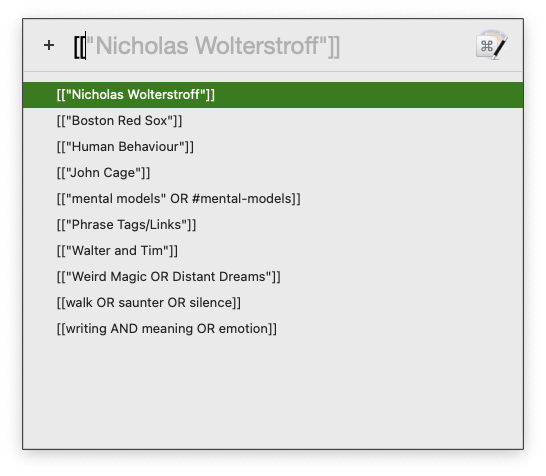
If your tag doesn't appear, hit ESC and the "add"...
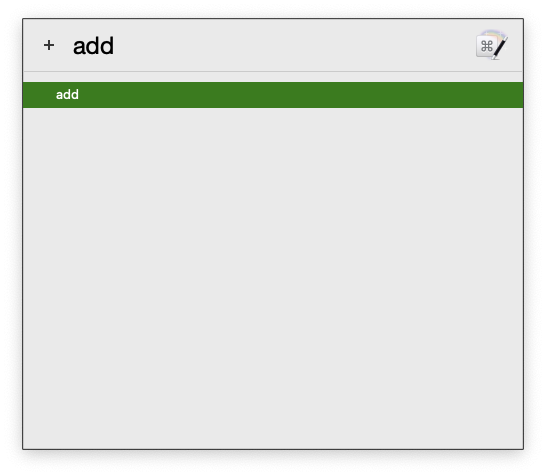
and you can add a new bracket tag...
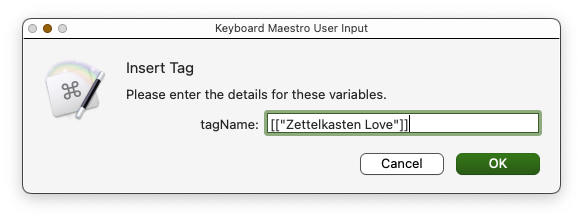
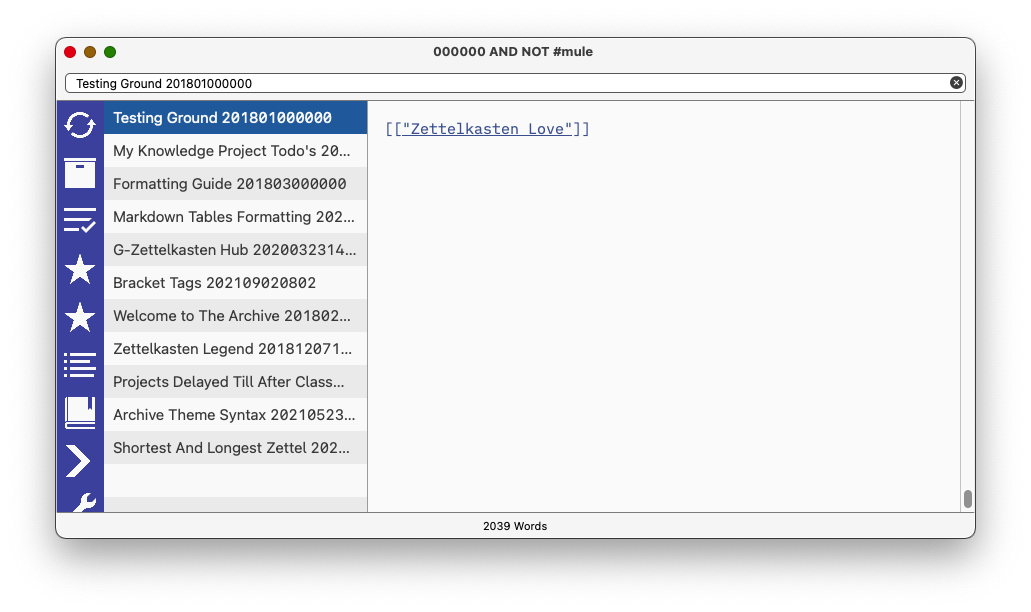
which is added to the list.
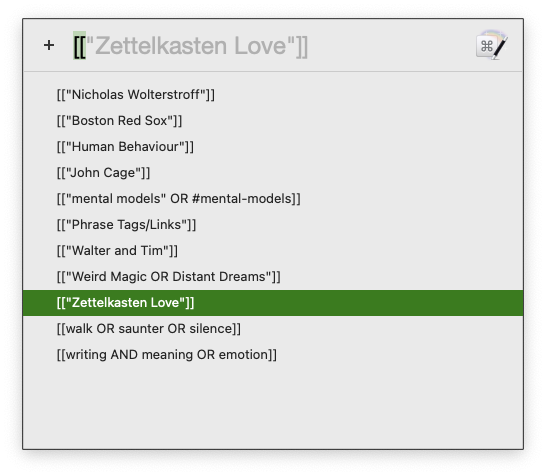
Your list will be blank at first and will build over time. You could run a simple shell script, grepping for a list of prior tags and using it to populate your list file.
Asset
**Tag Prompt
Will Simpson
My peak cognition is behind me. One day soon, I will read my last book, write my last note, eat my last meal, and kiss my sweetie for the last time.
My Internet Home — My Now Page
If you map the claims of your system to the individual Zettel the problem of mapping objects arises naturally. I am curious how your approach plays out.
However, I am pessimistic since you will have no place to let models on objects unfold organically. If you capture objects via tags you will map objects as unstructured lists unless you move from tags to Structure Notes which would add some tools and depth to your arsenal.
One of the main benefits of the Zettelkasten Method is its flexibility regarding how and what you map across the whole system. This makes it possible to let two different species of knowledge or even just text live next to each other. I have for example dreams, short prose next to my research on mythology and psychology. And it works very well.
If you map each note with a claim you limit yourself to just use one type of knowledge structure to make up the substance of your Zettelkasten. You will sacrifice a chunk flexibility of the Zettelkasten Method. It could be worth it but, I mentioned before, I am rather pessimistic.
I am a Zettler
@Sascha makes a great argument showing how "unstructured lists" vary from "Structure Notes."
I'm still on the fence about what value, in the end, I can gain from structuring my notes, given my dependence on search and atomicity. Bracket Tags are another tool in the zettelkasting tool belt. I'm experimenting, and we'll see. I'm open to the discovery that I'm misguided. I think we're claiming that an unstructured focused list has a place in fostering knowledge development. But @Sascha has opened my mind.
I'd argue that an unstructured list is a form of structuring. It is limited but the search query. I am open to @Sascha's claim that it is inflexible, and I'd say unstructured lists are an ad-hoc rudimentary structure.
Pictured below, the two forms of structure are in different sections of the same "Structure Note" and demonstrate how a little bit of structure adds a lot to the context. In the right-hand list, we have no idea what the numbskull who made this list was smoking when he made it.
Thanks, Sascha.
I'll let @micahredding respond. Each note can have more than one mapping/link with more than one claim. The claim defines the "Why am I making this particular link?" Even if it is not explicitly recorded, this is a noble practice to participate in when linking. Stopping and asking your future self why you are doing what you are doing. A knowledge structure has many types of links, one with a claim attached is just another one.
Will Simpson
My peak cognition is behind me. One day soon, I will read my last book, write my last note, eat my last meal, and kiss my sweetie for the last time.
My Internet Home — My Now Page
I'll offer an example that's similar to how I came to this practice. I'm interested in what others would do in this situation.
Suppose I'm writing a note on a piece of literature, and I find it casually using the term "Return on Attention". The meaning is self-evident in context, and yet it strikes me as a term of art.
Suppose, however, I have no other context for this term, I don't have any content about this term, I don't need to explain this term, and it's not part of my general focus of research and thought. And yet, I know it's an interesting concept, and may very well show up again.
How do I notate this term?
The first two options strike me as Premature Optimization. Doing nothing strikes me as inconsistent with my intrinsic sense of the significance of this term.
So my inclination is to choose #3, and keep moving. What would you do?
@micahredding, Bingo!
I'll comment on your ideas for notation then share with you a surprise and a bonus gift.
When I come across these "Terms of Art" (TOA) which itself is a TOA, I consider them gifts from the universe and are some of my most prized captures.
If you use #3, where would you place the bracted tag and why no just type in place rather than turning it into a bracket tag?
I'm still wondering about tags. I use tags for idea context with things like book, class, video, coding, etc. I find these useful for creating saved searches and quantitative analsys. But a TOA is just text. Easily found with full text search. So wonder about the value of a speculative bracket tag.
One strategy I've used is to put the TOA in the note I'm working on and place an interstitial tag #beautiful_language like this:
★★★★
Part of "Finding the Voice, Performing the Self 202108291512'
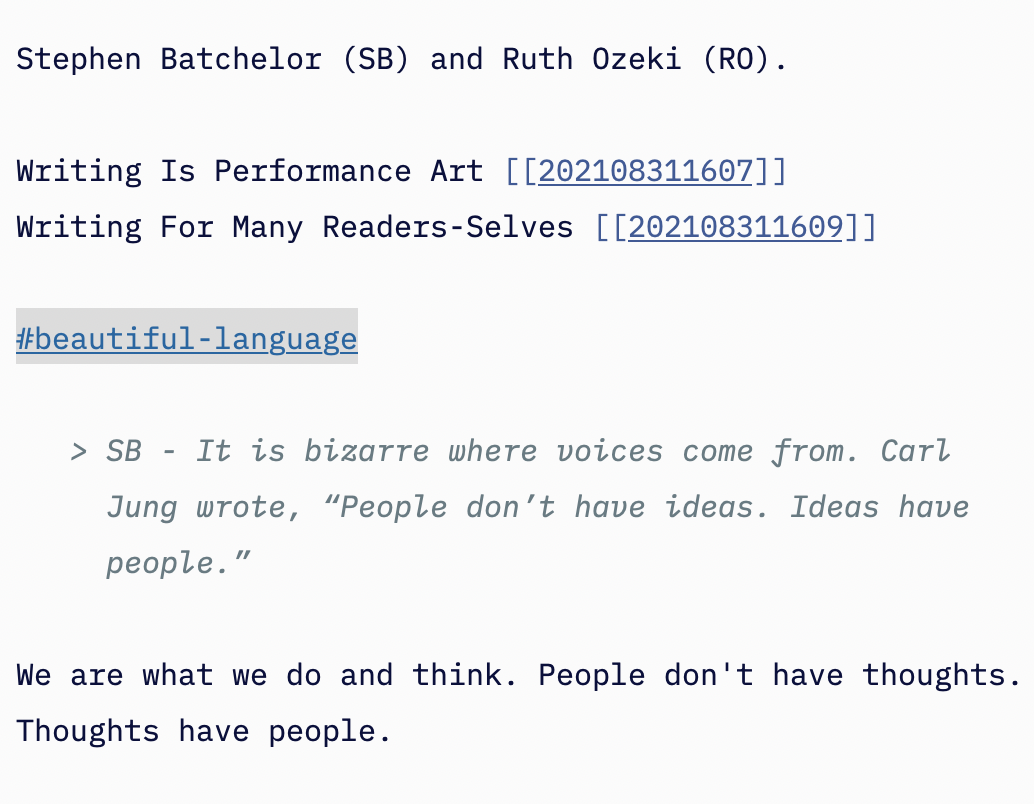
★★★★
Another strategy I have used is to make a quick note and place it in my #proofing list. Once captured, I can resume the original project feeling confident that the 'catch is in my creel'. Then I flush it out the next day, adding references, my ideas, and a couple of links if available. I don't worry too much about creating an initial link for this type of capture, and it'll get links from future ideas.
★★★★
The whole zettel "Polysyllabismic Obfuscationalization 201912201507"
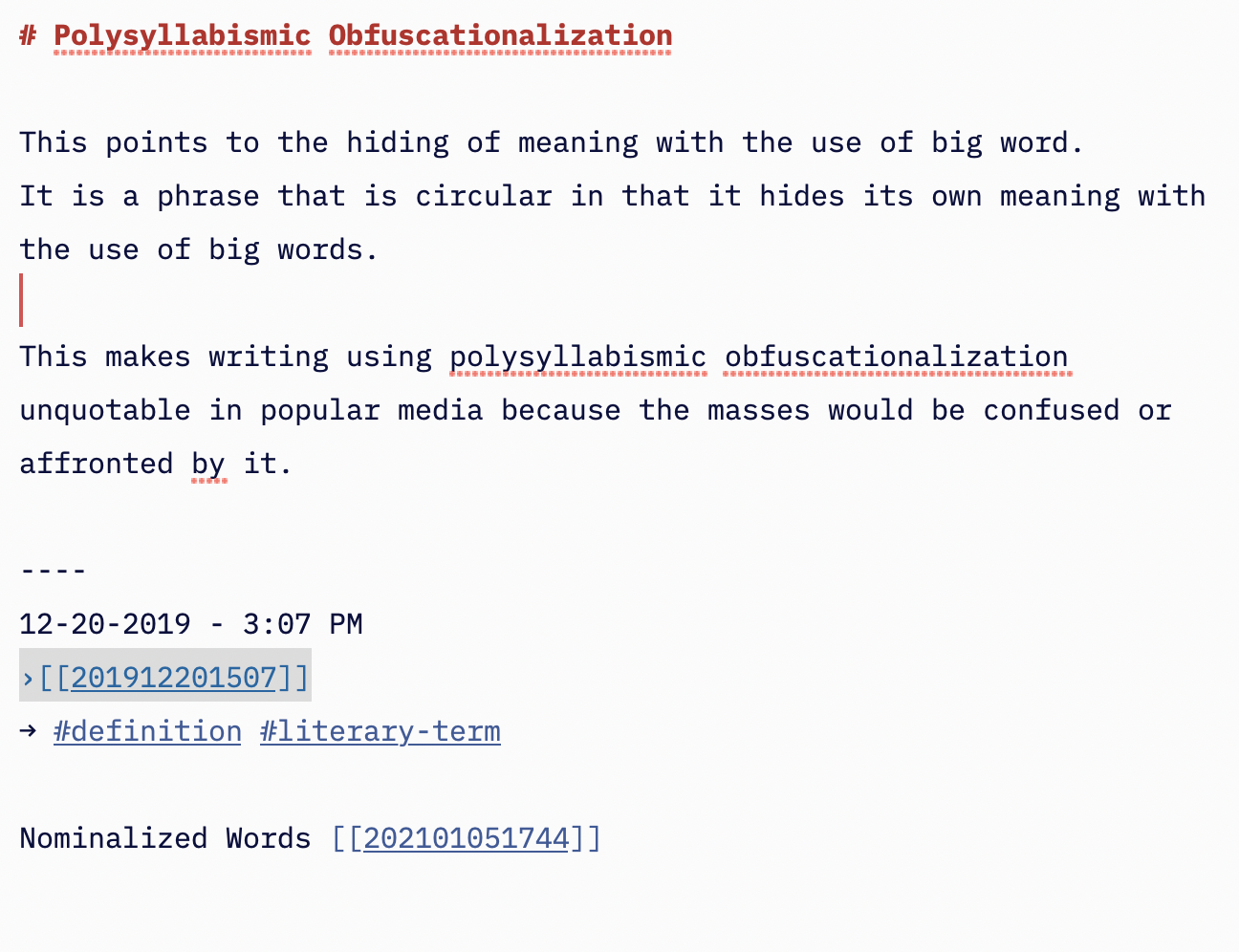
★★★★
Now for the surprise.
I have a note titled, "Return on Attention 201901281947". On the left in the note list are all the zettel that are paired with this note. The most resent pair was almost exactly two year after the idea was captured and 8 months ago.
Its an idea that I captured early in my career as an Zettelnaut and shows it. It has not been refactored yet. It is still in an ancient format. I was part of the discovery and investigation of note-taking workflows. Evernote and the Brain: Designing Creativity Workflows by Tiago Forte Dec 2015
Comparing The Archive's default note list population and a braket tag of [["Return on Attention"]], both return the same results in the note list.
★★★★
Now for the bonus gift!
As part of a new workflow I'm testing zettel sharing. I'm using an Keyboard Maestro macro to create a subset of my zettelkasten that contains all the zero level zettel paired with "Return on Attention 201901281947". You don't need Keyboard Maestro to make this work. You should be able to download this zip file and unzip it in your Downloads directory, then using the "Switch Archives..." menu item in The Archive, switch to this unzipped directory and surf the zero level links. I could share the first level links but in this case that would be 59 zettel instead of the 11 here. Is this at all helpful? Feed back would be appreciated.
Will Simpson
My peak cognition is behind me. One day soon, I will read my last book, write my last note, eat my last meal, and kiss my sweetie for the last time.
My Internet Home — My Now Page
I came up with another example of how to handle "Terms of Art" (TOA).
I posted a comment over here and stumbled on the TOA "syntactic sugar". I grabbed it and placed it on a note titled
Metaphors for Tool for Thought 202106040557a note that is a collection of TOA associated with Tools for Thought. Very quick.FYI, tags work in the forums! I placed the tag #syntactic_sugar over on the post and selecting it takes you to all the comments (2) that contain the tag. Unfortunately, bracket tags don't seem supported.
Will Simpson
My peak cognition is behind me. One day soon, I will read my last book, write my last note, eat my last meal, and kiss my sweetie for the last time.
My Internet Home — My Now Page
@micahredding I'm still exploring your notion and implementation of bracket tags.
I am working on a zettel,
Avoidance Is The Root Cause Of Failure 202110110735, and I find a plethora of related zettel and find it easier and more complete to use a bracket tag to link them. This is a loose linking. Here's the detail.[["avoid"]]This brings 103 zettel together under avoid, avoiding, or avoidance! Some of my bat senses are on high alert. Does this have value?? I didn't check all the related zettel, but the ones I did check were relevant and related.
I feel I'm preparing my zettelkasten for my future self. Stumbling across this note will stir this connection, but stumbling on the 103 other zettel will cause the same reaction.
What do you think? Is this a bad idea? Is this too weak of a link type to be of any value?
Will Simpson
My peak cognition is behind me. One day soon, I will read my last book, write my last note, eat my last meal, and kiss my sweetie for the last time.
My Internet Home — My Now Page
Sascha and I talked about this today, too, and my main takeaway was: I can't imagine yet what
[["avoid"]]will do in the long-term. I'm not claiming this is a useless practice. I search for words or phrases all the time (without making this a link, I just type the word(s)), but then I end up making a note of a useful selection of search results (or do nothing at all if the results aren't salvageable).Confront the options and the variety once, then reduce it to something more handle-able.
103 results is a lot to look at often. What appears on screen is not a curated overview, it's everything, the matches themselves. 🤔
Curation becomes impossible, as in: you cannot do it, if you go all the way and ditch links to notes in favor of bracket tags aka search shortcuts. The extreme form as stated by @micahredding in the very beginning would maybe allow creating an overview note, but you'd never link to it in the extreme form, so in @Will's example it becomes note 104 on "avoid" where previously there were 103. That's increasing, not reducing the amount of information you need to sift through.
I wonder how y'all who experiment with this deal with that problem, or if I just don't get the point.
Author at Zettelkasten.de • https://christiantietze.de/
Indulge me a moment while I regurgitate my thinking on the page. I'm thinking about how my future self would use and benefit from a link of this type. This is a weak, loose link meant as a reminder. It flags a search that I briefly investigated and saw some fruitfulness. This is something I'd want to be reminded of when I can around to writing an essay on failures and their causes or procrastination. A benefit of having an enormous hit count gives
[[avoid]]the flexibility to be associated with various other terms.avoid AND failures2 hitsavoid AND procrastination13 hitsavoid AND work55 hitsavoid AND art5 hitsA complete level of investigation is not called for right now and would have a grotesquely lopsided cost/benefit ratio. It would be 'productive procrastination' to dive into this rabbit hole at this moment, but it is something I want to remember when it is needed.
I'm prepping my future self.
Brain fart - update the number of hits a search term will produce with a mouse hover in real-time. Mockup - This is part of a structure note
Will Simpson
My peak cognition is behind me. One day soon, I will read my last book, write my last note, eat my last meal, and kiss my sweetie for the last time.
My Internet Home — My Now Page
To give an example of how this is working for me, when I first started making notes about Francis Bacon, I knew I wasn't ready to make an overview note, so I used a tag: #FrancisBacon. Since I was using the name multiple times per note, sometimes capturing slightly different claims, this began to seem awkward after a while.
At this point, I made an empty placeholder overview note, and started dropping a zettel link in every time I typed Francis Bacon [[201810311248]]. This too seemed awkward, a bit overkill, and it made it difficult to read the sentences I had written, given the fundamentally ambiguous nature of zettel links. The confusion of trying to parse these dense sentences may have been what triggered a further shift.
Eventually, I started using bracket tags, and found this to be lightweight, workable, and aesthetically pleasing.
As a result, my notes contain multiple different approaches. As of this moment:
394 notes match a loose search [[Francis Bacon]]
368 notes match a literal search [["Francis Bacon"]]
126 notes match #FrancisBacon
20 notes match [[201810311248]]
17 notes actually contain the bracket tag [["Francis Bacon"]]
Calculating 394-368 indicates that the loose search produced 26 false positives. The literal search (bracket tag) produced no false positives, but a lot of results. This results list allows me to get an overview of things, and scan through them all, jogging my memory about the notes that are there. I sometimes use this as a way of finding something I can't quite put my finger on.
Beyond this, I'm usually looking for something specific, so I'll skim the most recent results, or add on an additional search term to narrow things down. I rarely use bracket tag search to get to the structure note—if I need that, I just search for it directly.
So it may be that the answer to your question is that I use zettel links, and tags or bracket tags, in two different ways. And these are roughly the same ways I use claim notes, vs notes about something.
My note about Francis Bacon isn't actually that important—it's a collection of facts, and links to other structure notes that actually serve as a meaningful map or guide. Going to the main Francis Bacon overview note may be a bit of a last resort. Instead, I usually go directly to something more specific.
My particular claim notes, though, where I collect evidence for some particular viewpoint or proposition—that's fairly important, and I'll point there directly from a number of places.
These two different attitudes are reflected in bracket tags and zettel links, respectively. With a bracket tag, I'm mostly just trying to catch an unstructured glimpse of everything about this topic. With a zettel link, I'm interested in how this note fits in with other things based on it.
It hadn't occurred to me to try to make it easy to jump to the overview note for Francis Bacon directly. I just experimented, and it is totally possible to create a note titled
"Francis Bacon", and to have that be the auto-selected result of clicking a bracket tag. I've gone ahead and put a single line in that note, a zettel link to the actual overview note. I can see this being a helpful shortcut.So far, all of my notes use zettel IDs. To this point, I hadn't stripped down any of them to take advantage of auto-selection of tags or saved searches.